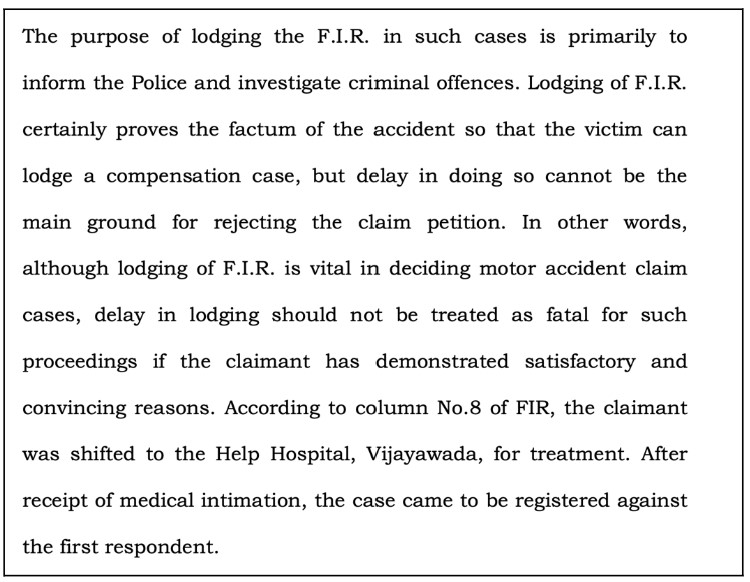In this week’s review of Court Judgments, we look at Madras High Court’s observation and order regarding a passport application of a person whose father was a Sri Lankan Migrant and mother, an Indian, Supreme Court’s denial of relief in a case of school teacher’s dismissal, J&K High court’s intervention to provide a widow with family pension, Delhi High Court’s order upholding right to full reimbursement for medical treatment and Andhra Pradesh High Court’s order against the Insurance company denying payment on basis of late filing of FIR.
Madras HC: Directs issue of Passport to a man whose mother is Indian and father is a Sri Lankan refugee
In the case of Neyatitus vs. The Regional Passport Officer, the Madurai bench of Madras High Court noted that we are still stuck in patriarchal notions and directed the Regional Passport authority to consider the representation of a man who had applied for an Indian Passport.
The court reasoned that this observation was based on the action of the authorities who assumed that the petitioner would partake of his father’s nationality even though his mother remained an Indian citizen making him eligible for an Indian passport.
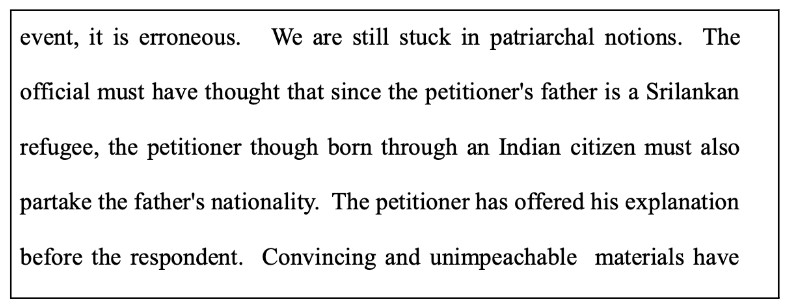
In this case, the petitioner’s application for Indian Passport was held up because in his birth certificate, he is mentioned to be a Sri Lankan refugee. He was called upon by the passport authorities to give an explanation.
The court referred to various statutes and precedents relating to citizenship. It noted that as per Section 3(1)(b) of the Citizenship Act 1955, every person born in India on or after the first day of July 1987, but before the commencement of the Citizenship (Amendment) Act, 2003 and either of whose parents is a citizen of India at the time of his birth shall be a citizen of India by birth.
The court applied these two criteria in the current case. The petitioner was born before the cut-off date i.e., on 18 January 2002. Furthermore, his mother was an Indian citizen by birth. Therefore, he met both statutory requirements.
In reference to his mention as a refugee, the bench noted that the parliament has yet to enact a law relating to refugees and also cited various precedents in which the courts have actively come forward to grant relief to the refugees.
While the court made the remark about his status as a migrant based on his father and overlooking the Indian citizenship of his mother, it pointed out that the authorities were not at fault since the petitioner’s birth certificate mentioned him as a Sri Lankan refugee.
The court was convinced that the petitioner has made out a case for a grant of relief and directed the authorities to process his application within a period of three weeks.
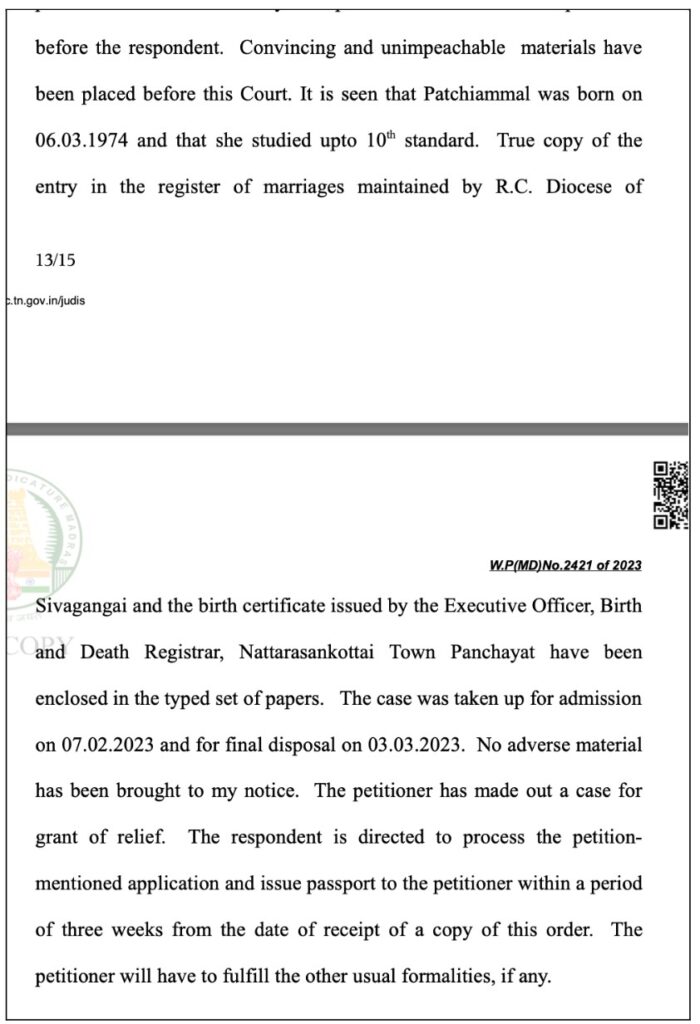
Supreme Court: Denies relief to School teacher dismissed for degree through Distance education
In the case of Sunil Kumar vs the State of Rajasthan & Ors, the Supreme Court Bench consisting of Justice V Ramasubramanian and Justice Pankaj Mithal reiterated that there can’t be equality in a matter of illegality.
As per the case details, the petitioner was appointed as a teacher in a government school in 1999. Within 15 days, he was terminated on the ground that his bachelor’s degree was through distance education mode. As per the rules, a person with a bachelor’s degree through distance is not eligible for employment as a teacher.
This order of termination was challenged by the petitioner before the High Court, which was dismissed. Hence, the petitioner approached Supreme Court.
In the argument on behalf of the petitioner, it was presented that the same judge has passed an order in favour of candidates who had secured a bachelor’s degree in education through distance education mode.
The Apex Court noted that the High Court judge had ruled in favour of certain other candidates. However, the same principle cannot be applied in this case because it is established that a person holding a bachelor’s degree through distance education mode is ineligible.
It stated that it is well settled that there cannot be equality in the matter of illegality.
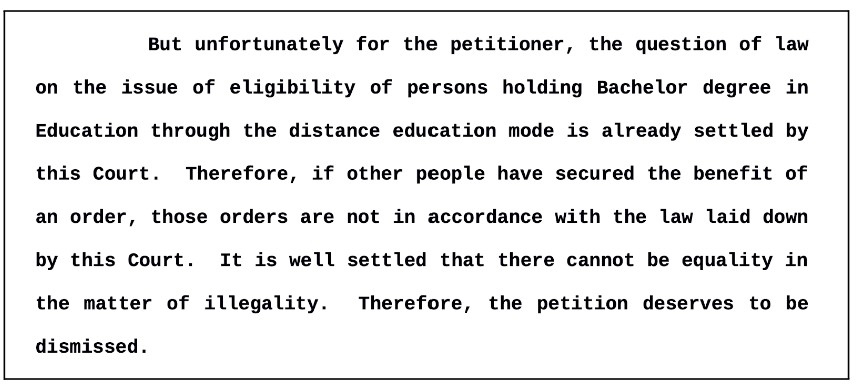
Jammu & Kashmir HC: Upholds widow’s rights to family pension despite divorce proceedings pending during husband’s lifetime.
Justice Rahul Bharti of Jammu and Kashmir and Ladakh High Court has recently ruled that a widow cannot be denied family pension after her husband’s death on the ground that there were ongoing divorce proceedings during his lifetime.
The judge was hearing the case Sonika Sharma vs Union of India, wherein a widow has sought the pension of her deceased husband, who was serving in the Border Security Force (BSF) till 2015.
As per the details of the case, after the demise of her husband, the petitioner had moved an application before the commanding officer for sanctioning the release of the family pension. She was the sole legal heir as her husband’s parents were no more and the couple did not have children.
This was rejected on the ground that her name was not found in the pension records of the deceased. The respondents submitted their clarification that her case for the processing of the family pension was not taken up because of the divorce petition. It was also submitted that the petitioner was earning monthly maintenance awarded by the court out of maintenance proceedings against her deceased husband during his life.
It was held by the court that family pension is a right under the law which can be taken away only if permitted by the law. It noted that there was no provision in the law which would justify the objection of the respondents to deny the petitioner her claim for sanction of the pension.
It noted that the stand taken by the authority was frivolous and without any legal basis. It directed the authorities to sanction and grant family pensions under rules along with any retrospective benefits.
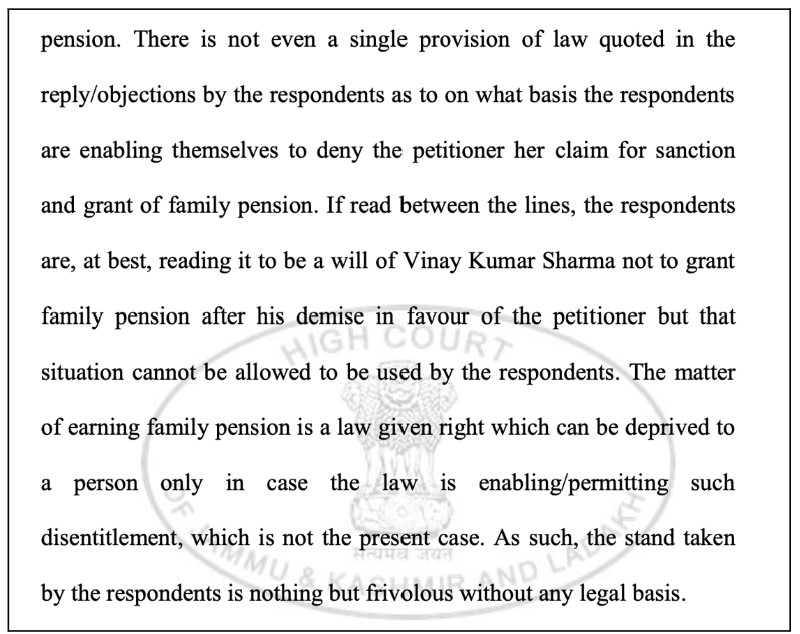
Delhi HC: State can’t deny medical reimbursement on ground that hospital charged amount exceeding approved rates
Delhi High Court ruled that reimbursement of medical expenses under Central Government (Medical Attendance) Rules, 1944 cannot be denied on the ground that the hospital charged an amount more than the approved rates.
It noted that the beneficiary employee cannot be faulted or penalised to pay the excess amount that was charged by the hospital, especially since the patient was referred to the particular hospital and it was not their choice.
As per the case, Mahendra Kumar Verma vs. Govt. of NCT of Delhi & Ors, the petitioner was serving as a reader in the court of Metropolitan Magistrate in Tis Hazari Court, Delhi. The petitioner claimed advances for the medical treatment of his minor child who was suffering from a brain tumour.
He was issued a letter from the respective authority asking him to deposit a sum of Rs. 51,854 against the medical advance of Rs. 2.34 lakhs granted to him from time to time for the medical treatment of his son in Rajiv Gandhi Cancer Institute.
His representation as to why he should not be fully reimbursed for the medical expenses was rejected. An order was passed by the District & Session Judge for recovery of the amount from the petitioner’s salary.
He filed a writ petition in 2006 challenging the deductions made from his salary and also sought recovery of the amount. In its submission to the High Court, the government stated that her petitioner is entitled to medical reimbursement only in terms of the Central Services (Medical Attendance) Rules, 1944 (CS (MA) Rules) as well as the instructions issued by the Government of NCT of Delhi from time to time.
It further submitted that after scrutinizing the medical bills and calculating the entitlement, it was found that the petitioner was entitled to a grant of Rs. 1,82,146 and hence is required to deposit the excess amount already sanctioned to him.
The counsel on behalf of the petitioner contended that the Right to health is a constitutional right under Article 21 of the Constitution of India and hence, the State is under the constitutional mandate to reimburse the government servant the expenses incurred on medical treatment. He submitted that the government servant is entitled to full reimbursement and cannot be restricted to the specified rates.
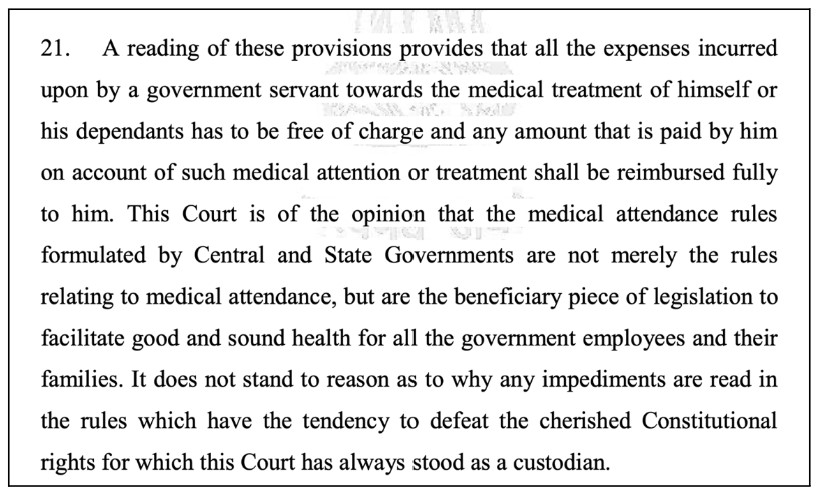
The court observed that as per CS(MA) Rules, 1994, the medical treatment availed by the government servants, or their dependants needs to be free of charge. It noted that any amount paid for such medical treatment has to be fully reimbursed.
Referring to the counter affidavit filed by the State, stated that not even a single provision of law has been cited to justify the deductions made in the petitioner’s claim. It further expressed dismay at how a petition seeking reimbursement of around Rs. 51 thousand remained pending for the past 16 years.
Andhra Pradesh HC: Delay in lodging FIR cannot be main ground for rejecting claim for compensation.
Andhra Pradesh High Court dismissed an appeal filed by an Insurance company against the award of compensation in a road accident case and stated that the delay in lodging FIR cannot be the main ground for rejecting the claim petition.
In the case, The National Insurance Company Ltd. vs. Komaravolu Srinivasa Bharadwaj and ors , the tribunal held that the accident occurred due to the rash and negligent riding of the offending vehicle and awarded compensation of Rs. 2.3 lakhs at the rate of 7.5% per annum from the date of the petition till the realization date against both the rider and the insurance company.
This was contended by the Insurance Company which stated that the tribunal failed to consider the hospital intimation received by the Police wherein it was mentioned that the accident occurred due to a bike skid. It also highlighted that the FIR was lodged two days after the accident and could be an afterthought to claim compensation.
The Court noted that the investigation was conducted based on the report filed before the police and a charge sheet was filed accordingly. It highlighted that there is no indication that the facts relating to the accident are suppressed or fabricated because of the delay. If any, they would have been identified as part of the investigation.
After going through the details placed in front of the court, it is of the view that the tribunal has reached a correct conclusion on the contentions raised. It stated that the Insurance company has failed to place any evidence to show that the contents of the chargesheet were incorrect.
